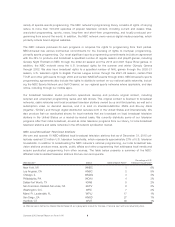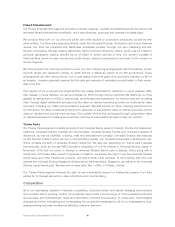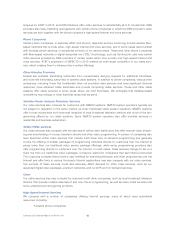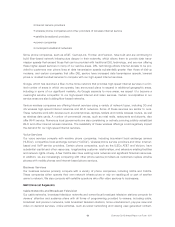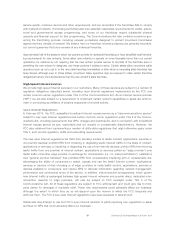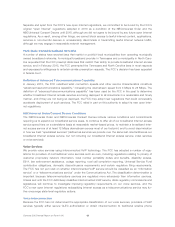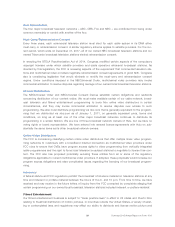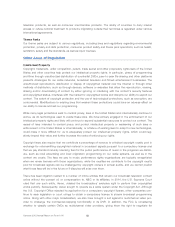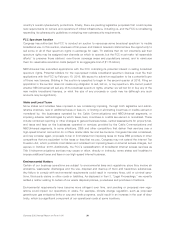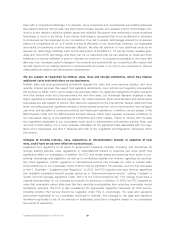Comcast 2015 Annual Report Download - page 21
Download and view the complete annual report
Please find page 21 of the 2015 Comcast annual report below. You can navigate through the pages in the report by either clicking on the pages listed below, or by using the keyword search tool below to find specific information within the annual report.Separate and apart from the FCC’s new open Internet regulations, we committed to be bound by the FCC’s
original “open Internet” regulations adopted in 2010 as a condition of the NBCUniversal Order and the
NBCUniversal Consent Decree until 2018, although we did not agree to be bound by any future open Internet
regulations. As a result, among other things, we cannot block access to lawful Internet content, applications,
services or non-harmful devices or unreasonably discriminate in transmitting lawful Internet network traffic,
although we may engage in reasonable network management.
Municipally Owned Broadband Networks
A number of states have enacted laws that restrict or prohibit local municipalities from operating municipally
owned broadband networks. A municipal broadband provider in Tennessee and a municipality in North Caro-
lina requested that the FCC preempt state laws that restrict their ability to provide broadband Internet access
service, and in February 2015, the FCC preempted the Tennessee and North Carolina laws in most respects
and expressed a willingness to entertain similar preemption requests. The FCC’s decision has been appealed
in federal court.
Definition of Advanced Telecommunications Capability
In January 2015, the FCC redefined what connection speeds and other service characteristics constitute
“advanced telecommunications capability,” increasing the downstream speed from 4 Mbps to 25 Mbps. The
definition of “advanced telecommunications capability” has been used by the FCC in the past to determine
whether broadband Internet access services are being deployed to all Americans in a reasonable and timely
manner, and if they are not being so deployed, the FCC may adopt new regulations that could conceivably
accelerate deployment of such services. The FCC relied in part on this authority to adopt its new open Inter-
net regulations.
NBCUniversal Order/Consent Decree Conditions
The NBCUniversal Order and NBCUniversal Consent Decree include various conditions and commitments
requiring us to expand our broadband service areas, to continue to offer all of our broadband Internet access
service speed tiers on a standalone basis at reasonable market-based prices, to maintain a broadband Inter-
net access service of at least 12 Mbps downstream across most of our footprint, and to avoid discrimination
in how we treat “specialized services” (defined as services we provide over the same last-mile facilities as our
broadband Internet access service, but not including our broadband Internet access service, video services
or voice services).
Voice Services
We provide voice services using interconnected VoIP technology. The FCC has adopted a number of regu-
lations for providers of nontraditional voice services such as ours, including regulations relating to privacy of
customer proprietary network information, local number portability duties and benefits, disability access,
E911, law enforcement assistance, outage reporting, rural call completion reporting, Universal Service Fund
contribution obligations, domestic discontinuance requirements and certain regulatory filing requirements.
The FCC has not yet ruled on whether interconnected VoIP service should be classified as an “information
service” or a “telecommunications service” under the Communications Act. The classification determination is
important because telecommunications services are regulated more extensively than information services.
Unless and until the FCC definitively classifies interconnected VoIP service, state regulatory commissions and
legislatures will continue to investigate imposing regulatory requirements on our voice services, and the
FCC’s new open Internet regulations reclassifying Internet access as a telecommunications service may fur-
ther encourage state-level regulatory actions.
Voice Interconnection
Because the FCC has not determined the appropriate classification of our voice services, providers of VoIP
services typically either secure CLEC authorization or obtain interconnection to traditional wireline phone
Comcast 2015 Annual Report on Form 10-K 18


